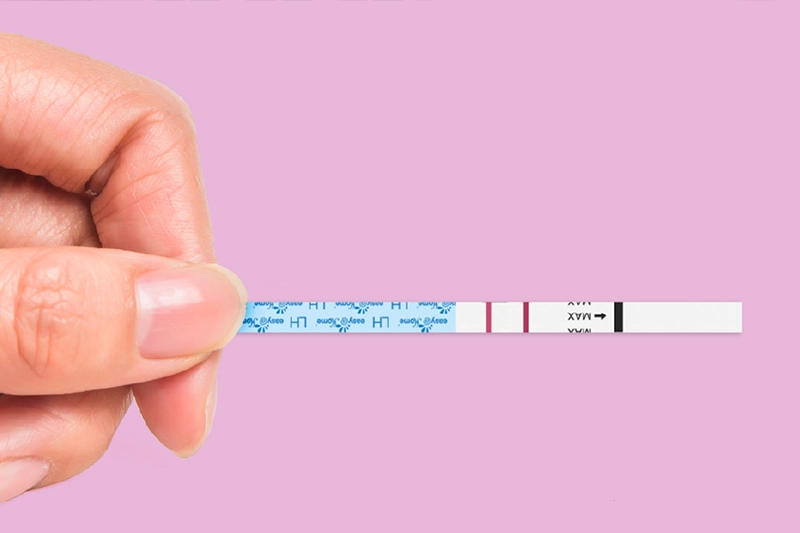If you are trying to conceive (TTC), you’ve probably taken an ovulation test before. Ovulation tests measure the amount of luteinizing hormone, or LH for short, in your urine. Measuring LH using ovulation predictor kits (OPKs) helps many women find their fertile window and optimizes their chances of getting pregnant.
What Is LH and Why Is It Important?
LH is a crucial reproductive hormone that causes ovulation to happen. This is when a mature egg is released from the ovary into the fallopian tubes for fertilization. How long after LH surge do you ovulate?
In a normal menstrual cycle, there is a surge of LH just before ovulation. [3] LH is extremely important because it determines the best time to have unprotected sex if you are trying to conceive. When to have sex after LH surge?
The day your LH surges and the day of ovulation are two of the days you should have sex, as well as every other day in your fertile window, which starts five days before ovulation. [12]
How to Properly Track LH
An accurate way of tracking LH is using OPKs. OPKs work by dipping a test strip into urine and comparing the test line with a control line. Premom’s ovulation test strips can be combined with the Premom app for extremely accurate results. Other methods of tracking ovulation include tracking your basal body temperature (BBT) or your cervical mucus.
Why Are My LH Levels Low?
If you have low LH levels, you likely haven’t ovulated yet. Your LH peaks when the time is right. Another reason for low LH levels is you did not track it in time. You may have rapid-onset type LH surge. [8] This means the LH surge happens between 12 hours and 1 day, making it easier to miss it. [1,9] According to a 2017 review, rapid-onset type is common, with nearly 43% of females having it.
The other 57% of females have gradual-onset LH surges, which happen over a period of 2-6 days. [9] Some females have low baseline LH levels, but there is still a chance of ovulation. Your cycle is normal as long as there is an LH surge before ovulation. However, it is rare for there to be too little LH for detection or little to no LH surge, which is often caused by malnutrition, eating disorders, pituitary disorders, or stress. [4]
How Will This Affect My Chances of Getting Pregnant?
On average, a female’s LH surge level is 20 to 100 mIU/ml, and around 25-30 mIU/ml LH is needed for ovulation. [6] Unfortunately, without sufficient levels of LH, ovulation will not happen, and without ovulation, pregnancy is not possible. [4]
How To Boost LH
The best and most efficient way to boost LH levels is to make changes in your lifestyle. Your habits have a huge impact on your hormone regulation and reproductive functions. Before considering supplements, you should make sure:
- You get enough nutrients from your diet.
- You get enough exercise each day.
- No stress for prolonged periods.
- You get more than 7 hours of sleep each night.
- You don’t drink more than 14 units of alcohol or smoke.
If you need help managing your lifestyle, speak to a health professional who can provide advice or a plan for a healthier and more balanced routine.
One supplement that increases LH and fertility is D-aspartic acid (DAA or D-Asp). DAA is an amino acid found in your pituitary gland and involved in your body’s function of synthesizing LH. Studies show that higher concentrations of DAA are associated with higher levels of LH and better fertility. [2,10]
Another supplement that increases LH is Vitex agnus-castus, otherwise known as chasteberry. Studies have shown this supplement is especially useful for women who have luteal phase defect (The second part of their menstrual cycle is abnormally short.) or abnormally high prolactin levels. [7] In a 2006 study, 93 women who struggled to conceive for 6 – 36 months were separated into 2 groups. 53 women were given a supplement containing chasteberry and other ingredients.
The other 40 were given a placebo. After 3 months, 14 women in the supplement group (26%) were able to conceive, compared to 4 women in the placebo group (10%). [11]
Studies that prove the benefits of DAA and chasteberry for increasing LH levels are currently limited. Consult your doctor before considering DAA or chasteberry supplements.
Alternative Methods of Tracking Ovulation
Using OPKs does not work for everyone. For example, people with polycystic ovary syndrome (PCOS) have naturally high baseline LH, which can make OPKs test positive. OPKs may also be difficult for people with irregular cycles or people nearing menopause. [5] That doesn’t mean you should stop using OPKs, but use them in conjunction with your BBT and/or your cervical mucus.
Pregnancy and Ovulation
LH is the hormone that induces ovulation. If your LH is low, you need to wait longer as you may not have ovulated yet or you missed testing at the time of your true LH peak. If your LH levels are low, it could be a sign of an underlying issue, talk to your healthcare provider to support your reproductive needs.
If you want to learn more about OPK testing, then check out the Premom App or some of our ovulation products.

By Sophia Zou
Medically reviewed by Dr. Patti Haebe, NMD
References
- Beckley, A. (2021, August 16). Can you ovulate without an LH surge? Proov. Retrieved June 30, 2023, from https://proovtest.com/blogs/blog/can-you-ovulate-without-an-lh-surge#
- D’Aniello, G., Grieco, N., Di Filippo, M. A., Cappiello, F., Topo, E., D’Aniello, E., & Ronsini, S. (2007, October 20). Reproductive implication of D-aspartic acid in human pre-ovulatory follicular fluid. PubMed. Retrieved July 6, 2023, from https://pubmed.ncbi.nlm.nih.gov/17951582/
- Definition of LH. (n.d.). National Cancer Institute. Retrieved June 30, 2023, from https://www.cancer.gov/publications/dictionaries/cancer-terms/def/lh
- Fritz, H. (n.d.). No LH Surge? How It Will Impact your Ovulation & Pregnancy Chances. Mira. Retrieved June 30, 2023, from https://www.miracare.com/blog/no-lh-surge/
- Galan, N. (2018, December 5). LH Surge: Timing Ovulation for Fertility (N. Khan, Ed.). Healthline. Retrieved June 30, 2023, from https://www.healthline.com/health/pregnancy/lh-surge#disadvantages-of-opks
- Leiva, R. A., Bouchard, T. P., Abdullah, S. H., & Ecochard, R. (2017, November 28). Urinary Luteinizing Hormone Tests: Which Concentration Threshold Best Predicts Ovulation? PubMed Central. Retrieved June 30, 2023, from https://www.ncbi.nlm.nih.gov/pmc/articles/PMC5712333/
- Petre, A. (2023, May 7). Vitex Agnus-Castus: Which Benefits of Chasteberry Are Backed by Science? Healthline. Retrieved July 6, 2023, from https://www.healthline.com/nutrition/vitex#womens-reproduction
- Stevenson, L. (2022, July 22). Why Are My Ovulation Test Peaks Low? Am I Not Ovulating? Premom. Retrieved June 30, 2023, from https://premom.com/blogs/how-to-use-ovulation-tests/why-are-my-ovulation-test-peaks-low-am-i-not-ovulating#
- Su, H.-W., Yi, Y.-C., Chang, T.-C., & Cheng, C.-M. (2017, May 16). Detection of ovulation, a review of currently available methods. PubMed Central. https://www.ncbi.nlm.nih.gov/pmc/articles/PMC5689497/#btm210058-bib-0014
- Topo, E., Soricelli, A., D’Aniello, A., Ronsini, S., & D’Aniello, G. (2009, October 27). The role and molecular mechanism of D-aspartic acid in the release and synthesis of LH and testosterone in humans and rats. PubMed Central. Retrieved July 6, 2023, from https://www.ncbi.nlm.nih.gov/pmc/articles/PMC2774316/
- Westphal, L. M., Polan, M. L., & Trant, A. S. (2006). Double-blind, placebo-controlled study of Fertilityblend: a nutritional supplement for improving fertility in women. PubMed. Retrieved July 6, 2023, from https://pubmed.ncbi.nlm.nih.gov/17211965/
- Wilcox, A. J., Dunson, D., & Baird, D. D. (2000, November 18). The timing of the “fertile window” in the menstrual cycle: day specific estimates from a prospective study. PubMed Central. Retrieved June 30, 2023, from https://www.ncbi.nlm.nih.gov/pmc/articles/PMC27529/#abstract-1title


